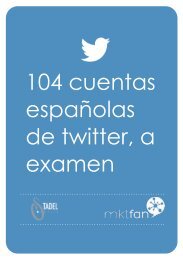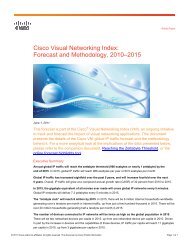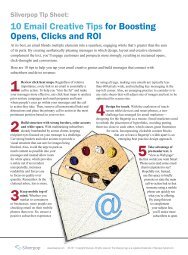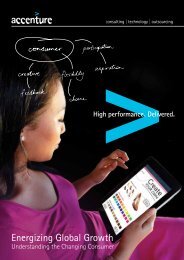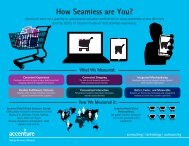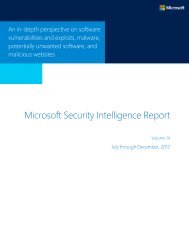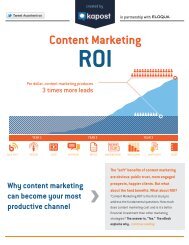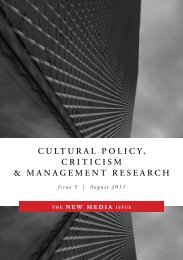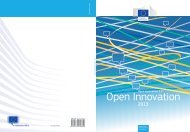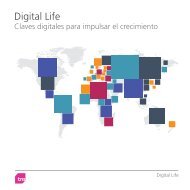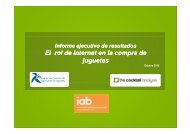How Teachers Are Using Technology at Home and in ... - Prisa Digital
How Teachers Are Using Technology at Home and in ... - Prisa Digital
How Teachers Are Using Technology at Home and in ... - Prisa Digital
You also want an ePaper? Increase the reach of your titles
YUMPU automatically turns print PDFs into web optimized ePapers that Google loves.
discourage students from f<strong>in</strong>d<strong>in</strong>g <strong>and</strong> us<strong>in</strong>g a wide range of sources for their research” (71%)<br />
60% agree with the idea th<strong>at</strong> “today’s digital technologies make it harder for students to f<strong>in</strong>d<br />
<strong>and</strong> use credible sources of <strong>in</strong>form<strong>at</strong>ion”<br />
Asked how likely their students were to use a variety of different <strong>in</strong>form<strong>at</strong>ion sources for a<br />
typical research assignment, 94% said their students were “very likely” to use Google or other<br />
onl<strong>in</strong>e search eng<strong>in</strong>es, plac<strong>in</strong>g it well ahead of the other sources asked about<br />
Second to search eng<strong>in</strong>es was the use of Wikipedia or other onl<strong>in</strong>e encyclopedias, which 75% of<br />
teachers said their students were “very likely” to use <strong>in</strong> a typical research assignment<br />
Round<strong>in</strong>g out the top three was YouTube or other social media sites, which about half of<br />
teachers (52%) said their students were “very likely” to use<br />
47% of these teachers “strongly agree” <strong>and</strong> another 44% “somewh<strong>at</strong> agree” th<strong>at</strong> “courses or<br />
content focus<strong>in</strong>g on digital literacy must be <strong>in</strong>corpor<strong>at</strong>ed <strong>in</strong>to every school’s curriculum”<br />
F<strong>in</strong>ally, asked to place a value on various skills today’s students will need <strong>in</strong> the future, “judg<strong>in</strong>g<br />
the quality of <strong>in</strong>form<strong>at</strong>ion” tops the list, described as “essential” by 91% of the teachers who<br />
particip<strong>at</strong>ed <strong>in</strong> the survey<br />
Given the focus on students’ onl<strong>in</strong>e <strong>in</strong>form<strong>at</strong>ion g<strong>at</strong>her<strong>in</strong>g, it is <strong>in</strong>terest<strong>in</strong>g to measure the extent to<br />
which their teachers rely on search eng<strong>in</strong>es <strong>and</strong> onl<strong>in</strong>e encyclopedias for <strong>in</strong>form<strong>at</strong>ion. The survey f<strong>in</strong>ds<br />
th<strong>at</strong> the vast majority of AP <strong>and</strong> NWP teachers use search eng<strong>in</strong>es (99%) <strong>and</strong> Wikipedia (87%) to f<strong>in</strong>d<br />
<strong>in</strong>form<strong>at</strong>ion onl<strong>in</strong>e. The l<strong>at</strong>ter is particularly notable, because both teachers <strong>and</strong> students mentioned <strong>in</strong><br />
focus groups th<strong>at</strong> teachers commonly bar students from us<strong>in</strong>g Wikipedia <strong>in</strong> their school assignments.<br />
The survey also f<strong>in</strong>ds th<strong>at</strong> almost all of the teachers surveyed use the <strong>in</strong>ternet “to do work or research<br />
for their job.” The specific ways these teachers use the <strong>in</strong>ternet as a tool for professional development<br />
<strong>and</strong> curricular ideas are discussed l<strong>at</strong>er <strong>in</strong> this report.<br />
p e w<strong>in</strong>ter n e t .o r g 21



